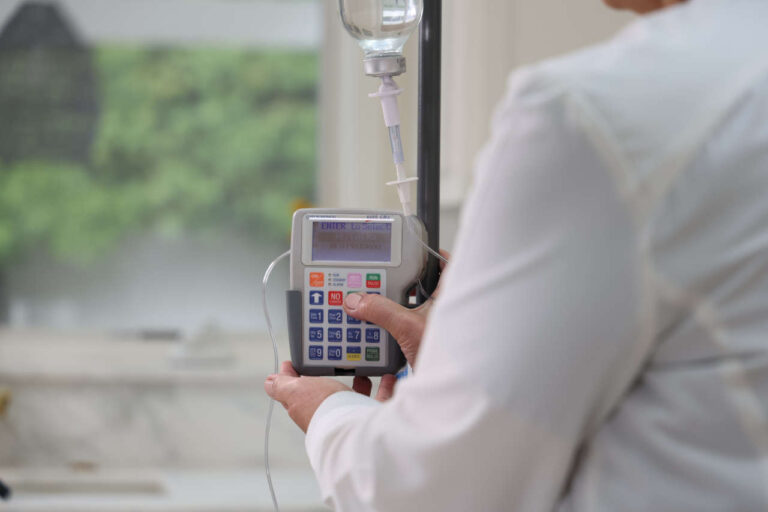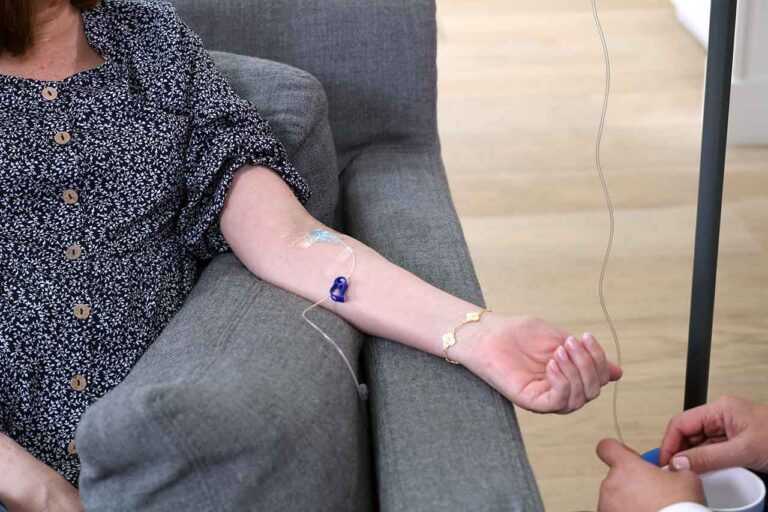
Carimune, also known by its generic name, immune globulin IGIV, is a medication typically prescribed to strengthen the immune system in patients who are at higher risk of certain infections.
Consult an IVIG Specialist | The Best IVIG Home Infusion
Carimune belongs to the “immune globulins” drug class, and it is made up of highly purified and concentrated forms of IgG antibodies (96% of IgGs). This medication contains IgG immunoglobulins prepared from the pooled plasma of thousands of healthy donors.
Carimune is available in sterile, lyophilized powder form that is reconstituted before infusion. Currently, this medication is being sold under various common brand names such as Bivigam, Flebogamma, Gammagard को परिचय S/D, Gammaplex, Octagam को परिचय, Panzyga, Privigen को परिचय, Vigam, Vivaglobulin, and Carimune NP.
What Is Carimune Used to Treat?
In addition to strengthening the patient’s immune system, Carimune can also be prescribed for the following conditions:
- Primary immunodeficiencies (PID)
- B-cell chronic lymphocytic leukemia
- Acute or chronic idiopathic thrombocytopenia purpura (ITP)
- Kawasaki syndrome
- बहु-फोकल मोटर न्यूरोपैथी
- डर्मेटोमायोसाइटिस
- क्रोनिक इन्फ्लेमेटरी डिमाइलिनेटिंग पोलिन्यूरोपैथी (CIDP)
IGIV may also be used off-label for other purposes not listed in this medication guide.
यस्ले कसरी काम गर्छ?
Since Carimune contains 96% of all IgG antibodies, it exerts a wide range of effects in patients with different conditions, which are as follows:
It Boosts the Immune System
Patients with primary immunodeficiency disorders such as X-linked agammaglobulinemia, common variable immunodeficiency, and severe combined immunodeficiency are more prone to various infections.
Carimune works to boost the immune system by supplying the missing or deficient antibodies, ultimately reducing the frequency and severity of infection in these patients.
It Increases Blood Clotting Cells (Platelets)
Patients with acute or chronic idiopathic thrombocytopenia purpura experience low levels of blood-clotting cells called platelets due to the attack of autoantibodies (abnormal antibodies produced by the immune system against healthy cells such as platelets).
Carimune works to increase the level of platelets by neutralizing the effects of autoantibodies.
It Modulates Hyperactive Immune Responses
Similarly, Carimune also neutralizes or blocks the action of autoantibodies in patients with CIDP or multifocal neuropathy (a disorder in which the immune system attacks the nerves).
It Prevents Infection and Aneurysm
In patients with B-cell chronic lymphocytic leukemia, Carimune helps to prevent certain infections. It also prevents aneurysms (which occur as a result of weakness in the main artery of the heart) in patients with Kawasaki disease.
उपलब्ध खुराक फारम र शक्तिहरू के के हुन्?
Carimune comes in single-dose vials containing a white, lyophilized powder in the following strengths:
- 3 g Carimune
- 6 g Carimune
- 12 g Carimune
You can only reconstitute the product in the following diluents: sterile water, 5% dextrose, or sterile (0.9%) sodium chloride injection USP.
What Is the Usual Dosage of Carimune?
The dosage of Carimune is adjusted according to the patient’s body weight and disease severity. The following are the recommended doses of Carimune for ITP and primary immunodeficiency (PID).
Dosage for ITP
For the treatment of ITP, a dose of 0.4g/kg of body weight should be administered in patients for 2 – 5 consecutive days.
Dosage for PID
The recommended dosage for the treatment of primary immunodeficiency in adults and children is 0.4 to 0.8 g/kg and should be administered once every 3 to 4 weeks.
How Is Carimune Given?
Carimune is given as an intravenous infusion in the vein once every 3 to 4 weeks by an experienced healthcare provider.
कोपे सहायताको बारेमा विशेषज्ञसँग कुरा गर्नुहोस्
What Are the Side Effects of Carimune?

Carimune has some side effects, along with its wide range of potential benefits. The following are the commonly reported side effects:
- Arthralgia (joint pain)
- Myalgia (muscle pain or weakness)
- Transient skin reactions (such as rash, erythema, pruritus, urticaria, eczema or dermatitis)
- Headache or dizziness
- Nausea, diarrhea, or stomach pain
- ज्वरो
- Increased blood pressure and heart rate
- पसिना आउने
Though it is rare, it can also cause some serious side effects, which include:
- An increase in creatinine and रगत युरिया नाइट्रोजन (BUN)
- थ्रोम्बोसिस
- Renal (kidney) dysfunction such as acute renal failure, acute tubular necrosis, proximal tubular nephropathy, and osmotic nephrosis with progression to oliguria or anuria (little or no urine)
- Lung problems such as difficulty breathing, chest pain, or blue-colored lips or skin
- डिहाइड्रेसन
- Aseptic meningitis
- रगत जम्नु
If you experience any side effects, immediately stop the infusion and consult your healthcare provider.
What Precautions Should You Take?
Before taking Carimune infusion, it is important to consult your healthcare provider and share your current health status and medical history. Tell your doctor if you are:
- गर्भवती वा गर्भवती हुने योजनामा: Since there is no data available on the effects of Carimune on an unborn baby, it is not known whether it can cause fetal harm or not. Therefore, it is important to consult your healthcare provider before taking Carimune infusion.
- स्तनपान: It is not clear whether Carimune passes to breastmilk; therefore, it is recommended that you avoid taking it if you are breastfeeding.
- IgA deficient, especially if you have known antibodies against IgA
- Allergic to immunoglobulin products
- लिँदै estrogen pills or contraceptives
Since this medication can cause blood clots or renal failure in older people or people with certain conditions, it is important to tell your doctor if you have ever had:
- मधुमेह मेलिटस
- सेप्सिस
- मिर्गौला रोग
- Stroke or blood clot
- मुटुको समस्या
- Nephrotoxic drugs
Carimune is administered at a minimum concentration with a slow infusion rate in such patients.
What Important Things Should You Know About Carimune?
Carimune can cause acute renal failure if you have a history of renal insufficiency. Similarly, it can also increase your risk of thrombosis if you have a history of venous or arterial thrombosis, hyperviscosity syndrome, or cardiovascular disease.
Can IVIG help? | Free IVIG Treatment Info
How Much Does Carimune Cost?
The cost of Carimune can be notably high for some patients. A single-dose vial of 6 g of intravenous powder costs about $611, and 12 g costs about $1,212.
The cost of the medication can vary depending on the pharmacy you visit. However, if you are considering Carimune, it is advisable to consult with your healthcare provider about potential assistance programs that can help reduce out-of-pocket expenses.
Drug Summary
Carimune is a medication made up of immunoglobulins extracted from the blood plasma of healthy donors. It is used to reduce infection risks and treat conditions such as B-cell chronic lymphocytic leukemia, CIDP, ITP, PID, multiple focal neuropathies, and Kawasaki syndrome.
सन्दर्भहरू:
- The Food and Drug Administration (FDA): Carimune Prescribing Information: https://www.fda.gov/media/76582/download?attachment
- Berger, M., Cunningham-Rundles, C., Bonilla, F. A., Melamed, I., Bichler, J., Zenker, O., & Ballow, M. (2007). Carimune NF Liquid is a Safe and Effective Immunoglobulin Replacement Therapy in Patients with Primary Immunodeficiency Diseases. Journal of Clinical Immunology, 27(5), 503–509. https://doi.org/10.1007/s10875-007-9096-9
- Carimune, N. F., Flebogamma, D. I. F., & Oderda, G. (2015). Immune Globulin Agents (Human) Drug Class Review. https://medicaid.utah.gov/pharmacy/ptcommittee/files/Criteria%20Review%20Documents/2015/2015.10%20Immune%20Globulin%20Agents%20Drug%20Class%20Review.pdf
- Vo, A. A., Cam, V., Toyoda, M., Puliyanda, D. P., Lukovsky, M., Bunnapradist, S., … & Jordan, S. C. (2006). Safety and adverse events profiles of intravenous gammaglobulin products used for immunomodulation: a single-center experience. Clinical Journal of the American Society of Nephrology, 1(4), 844-852. DOI: 10.2215/CJN.01701105
- Levine, A. A., Levine, T. D., Clarke, K., & Saperstein, D. (2017). Renal and hematologic side effects of long-term intravenous immunoglobulin therapy in patients with neurologic disorders. Muscle & Nerve, 56(6), 1173-1176. https://doi.org/10.1002/mus.25693













